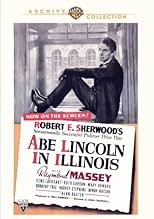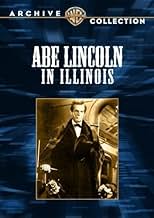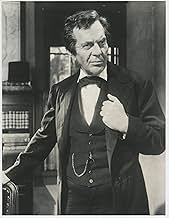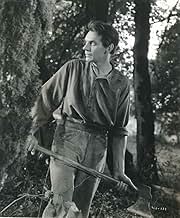VALUTAZIONE IMDb
7,3/10
2206
LA TUA VALUTAZIONE
Aggiungi una trama nella tua linguaHumble Abraham Lincoln gains the respect of his Illinois neighbors, growing in stature and respect until he is elected President in 1860 and departs for Washington.Humble Abraham Lincoln gains the respect of his Illinois neighbors, growing in stature and respect until he is elected President in 1860 and departs for Washington.Humble Abraham Lincoln gains the respect of his Illinois neighbors, growing in stature and respect until he is elected President in 1860 and departs for Washington.
- Regia
- Sceneggiatura
- Star
- Candidato a 2 Oscar
- 2 vittorie e 2 candidature totali
Howard Da Silva
- Jack Armstrong
- (as Howard da Silva)
Recensioni in evidenza
I absolutely loved this movie! maybe it is because I am a history buff but I thought it was wonderful!. I am currently doing a project on Abraham Lincoln where my friends and I on working on a student directed film about Abraham Lincoln and you can not imagine how much this movie has helped me. This movie tells the tale of one of the greatest man in history and how he evolved along the way to become even greater. I can only hope that this movie will help someone see the wonders of his life as it helped me and as Honest Abe helped so many other people. I loved it when they showed his debate with Stephen Douglas. That was really the highlight of the movie because it showed him giving his real opinion and it caught my attention. His speech was amazing!! 10 thumbs up!!!! :D
Abe Lincoln is one of the most misunderstood figures in American history--perhaps THE most misunderstood. So much of what we assume are facts are actually myths and misrepresentations--some of which were promoted by writers and some by films of the 30s and 40s. While ABE LINCOLN IN ILLINOIS is far from perfect, it is light-years ahead of the other contemporary works in giving a balanced account of Lincoln's life. While heroic in many ways, Lincoln is more of a man in this film and the facts are generally true--and that's a lot more than can be said of such sentimental hogwash as D.W. Griffith's 1930 fiasco ABRAHAM LINCOLN--which is basically one myth after another strung together!! I can say all this because I am well educated about the man and am an American history teacher--so my opinion should mean something.
One of the common myths that has abounded was the Ann Rutledge romance. While it's uncertain exactly how much they were in love (was it just a passing romance or something deeper), it's obvious that they were NOT as they were portrayed in ABRAHAM LINCOLN with all of its syrupy sweetness. Read up on the controversy yourself--opinions vary and there's no concrete evidence to prove either extreme. Here in ABE LINCOLN IN ILLINOIS, they seem to take the position that the love between them was just beginning to blossom when she died and that that was about it.
Another myth is that Lincoln was 100% against slavery and that he personally freed the slaves (that was actually done by Congress and the 13th amendment). The real life Lincoln, though opposed to slavery, was more concerned with unity and preserving the nation. Fortunately, ABE LINCOLN IN ILLINOIS gets this right--they show Lincoln as being torn by these two divergent interests. Most books and films portray him as "the Great Emancipator"--though Lincoln would have allowed slavery to keep the country from war and he did see class distinctions between the races.
The other big myth is that Lincoln was sort of a "dumb hillbilly" and that he stumbled into greatness. While in this film he is a simple man, of sorts, he also is amazingly clever and has a great way with dealing with people. And, occasionally, he was a bit devious. While the film doesn't have a chance to show his political savvy and willingness to "forget" the Constitution during the war in order to keep the country together, he is relatively shrewd in this film.
As for Mary Todd, in the film as in real life, she was a conniver and a very unstable woman. While her mental instability was only briefly shown in this film (as in reality--her mental condition greatly deteriorated after her husband was President as well as his death) but at least it was mentioned. Plus, her intense drive was a major focus of the film--as it was in Lincoln's own real life. She was a hard-driving and rather nasty woman if you read more about her (and rather mentally unstable in her later years).
As a long-winded teacher, I could go on, but probably should wrap it up now. The film is reasonably accurate and tends to show Lincoln, warts and all--something films up until then neglected. Additionally, Raymond Massey's performance was superb and the film was both entertaining and inspiring. Interestingly enough, Massey was a Canadian and did a much better job than the Americans who have tackled this role.
One of the common myths that has abounded was the Ann Rutledge romance. While it's uncertain exactly how much they were in love (was it just a passing romance or something deeper), it's obvious that they were NOT as they were portrayed in ABRAHAM LINCOLN with all of its syrupy sweetness. Read up on the controversy yourself--opinions vary and there's no concrete evidence to prove either extreme. Here in ABE LINCOLN IN ILLINOIS, they seem to take the position that the love between them was just beginning to blossom when she died and that that was about it.
Another myth is that Lincoln was 100% against slavery and that he personally freed the slaves (that was actually done by Congress and the 13th amendment). The real life Lincoln, though opposed to slavery, was more concerned with unity and preserving the nation. Fortunately, ABE LINCOLN IN ILLINOIS gets this right--they show Lincoln as being torn by these two divergent interests. Most books and films portray him as "the Great Emancipator"--though Lincoln would have allowed slavery to keep the country from war and he did see class distinctions between the races.
The other big myth is that Lincoln was sort of a "dumb hillbilly" and that he stumbled into greatness. While in this film he is a simple man, of sorts, he also is amazingly clever and has a great way with dealing with people. And, occasionally, he was a bit devious. While the film doesn't have a chance to show his political savvy and willingness to "forget" the Constitution during the war in order to keep the country together, he is relatively shrewd in this film.
As for Mary Todd, in the film as in real life, she was a conniver and a very unstable woman. While her mental instability was only briefly shown in this film (as in reality--her mental condition greatly deteriorated after her husband was President as well as his death) but at least it was mentioned. Plus, her intense drive was a major focus of the film--as it was in Lincoln's own real life. She was a hard-driving and rather nasty woman if you read more about her (and rather mentally unstable in her later years).
As a long-winded teacher, I could go on, but probably should wrap it up now. The film is reasonably accurate and tends to show Lincoln, warts and all--something films up until then neglected. Additionally, Raymond Massey's performance was superb and the film was both entertaining and inspiring. Interestingly enough, Massey was a Canadian and did a much better job than the Americans who have tackled this role.
10lugonian
ABE LINCOLN IN ILLINOIS (RKO Radio, 1940), directed by John Cromwell, is not so much a biography of Abraham Lincoln, but the life Lincoln lived from his early years to a position that would lead him to politics, and against all odds, his winning the election for the United States presidency in 1860. Based on the Pulitzer Prize winning 1938 play by Robert E. Sherwood, the screen adaptation, tracing Lincoln's thirty years starting in 1831 to his train ride leading to Washington, D.C., in 1861, stars Raymond Massey in a role he originated on stage, being the best performance of a great American ever enacted by an actor who wasn't. Massey, a Canadian by birth, is not only the perfect candidate for the title role, but an ideal choice. Massey's believability in his role earned him an Academy Award nomination as Best Actor. Although he didn't win the election for that year, it is Massey who very well holds this movie together.
A follow-up of sorts to John Ford's most recent YOUNG MR. LINCOLN (20th Century-Fox, 1939), starring Henry Fonda, focusing on Lincoln's early years as a young lawyer in Springfield, Ill., and a retelling in parts to D.W. Griffith's ABRAHAM LINCOLN (United Artists, 1930), starring Walter Huston, ABE LINCOLN IN ILLINOIS starts off on a rainy afternoon in 1831 with an introduction to the character of Abraham Lincoln (Raymond Massey), age 22, sitting on the floor in a log cabin reading a book by Shakespeare, accompanied by his father (Charles B. Middleton) and a stepmother (Elisabeth Risdon). With the Lincoln family background briefly depicted, the next scene follows Abe, who had left home to accept a $30 a month job as part of the crew rowing a flatboat hauling hogs down the Sangamon River to New Orleans. Along the way he encounters a very beautiful girl named Ann Rutledge (Mary Howard), with whom he decides to settle down in her native town of New Salem where he becomes in charge of a general store, a position offered him by his employer, Denton Offut (Harlan Briggs). When he finds Jack Armstrong (Howard Da Silva), the greatest fighter who cannot be beat, a little drunk and annoying Ann, who, along with his other friends, having invaded her tavern, Abe, a stranger in town, comes to the young lady's defense and publicly wrestles Jack to the end, defeating his advisory and winning the admiration from all, especially the respect and loyal-ship of Jack Armstrong. The year 1832 profiles Lincoln acting as leader in command of his soldiers, with Armstrong being among them, during the Blackhawk War period; 1835 now finds Lincoln in a new position as postmaster general. He is visited by Joshua Speed (Minor Watson) and Ninian Edwards (Harvey Stephens) who introduce Abe to politics by choosing him to serve in the legislature, which he would serve four terms. As for Ann, having been engaged to John McNeil (Maurice Murphy), now living in New York for two years, finds that after receiving a letter from him that he has no intentions of returning to her. To stop gossip from circulating around Ann's good name, Abe admits his love for her from the moment he first saw her, and asks her to become his steady. The relationship between them is cut short when she is stricken with an illness and dies. Lincoln quits the legislation to work in the law office with John Stuart in Springfield, forming a partnership of Stuart & Lincoln, Counselors-at-Law. Slowly improving his social position, Lincoln is introduced to Mary Todd (Ruth Gordon) at a function given by her sister and Ninian's wife, Elizabeth Edwards (Dorothy Tree). Elizabeth wants Mary to marry an aristocrat, someone like Stephen A. Douglas (Gene Lockhart), but her interest rests on Mr. Lincoln, whom she eventually marries on November 4, 1842. The marriage produces four sons (the movie indicates three, eliminating one who died in his fourth year), and shows Mary's fight in having her hayseed husband fulfill his destiny, to become president of the United States.
Ruth Gordon (1896-1985), a prominent stage actress and playwright, in her movie debut, gives a remarkable performance in one of the best carnations of Mary Todd Lincoln ever portrayed on screen. Gene Lockhart (1892-1957), a veteran character actor in many feature film roles, goes unnoticed as a very satisfying Stephen A. Douglas (1813-1861). Lockhart's best moment finds his Stephen Douglas sincerely congratulating his opponent Abraham Lincoln in winning the U.S. election, something that should become a prime example with modern-day candidates.
As mentioned before, ABE LINCOLN IN ILLINOIS is very much a retread to D.W. Griffith's 1930 presentation of ABRAHAM LINCOLN, with differences being the elimination of Lincoln's birth, his trying years in the White House during the Civil War and assassination in April 1865. In many ways, ABE LINCOLN IN ILLINOIS is an excellent movie with excellent portrayals. Being a screen adaptation to a stage play, John Cromwell's direction, makes no indication as such. Minus Technicolor, it's full of outdoor scenery and historical detail ranging from costumes to reproductions of small towns. Highlights include the well staged Lincoln-Douglas debate, and one where Lincoln finally losing his temper towards his wife, Mary, after embarrassing him in front of his committee, by ordering her, twice, "You're not/never to do that again!"
ABE LINCOLN IN ILLINOIS, formerly shown on commercial television annually either on or around Lincoln's birthday, February 12, later presented on video cassette finally on cable television's American Movie Classics prior to 2000, and Turner Classic Movies. Quite enjoyable as a motion picture, and quite informative on a historical point of view, this production, at 110 minutes, succeeds on both counts. "Glory, Glory Hallelujah, his truth is marching on." (****)
A follow-up of sorts to John Ford's most recent YOUNG MR. LINCOLN (20th Century-Fox, 1939), starring Henry Fonda, focusing on Lincoln's early years as a young lawyer in Springfield, Ill., and a retelling in parts to D.W. Griffith's ABRAHAM LINCOLN (United Artists, 1930), starring Walter Huston, ABE LINCOLN IN ILLINOIS starts off on a rainy afternoon in 1831 with an introduction to the character of Abraham Lincoln (Raymond Massey), age 22, sitting on the floor in a log cabin reading a book by Shakespeare, accompanied by his father (Charles B. Middleton) and a stepmother (Elisabeth Risdon). With the Lincoln family background briefly depicted, the next scene follows Abe, who had left home to accept a $30 a month job as part of the crew rowing a flatboat hauling hogs down the Sangamon River to New Orleans. Along the way he encounters a very beautiful girl named Ann Rutledge (Mary Howard), with whom he decides to settle down in her native town of New Salem where he becomes in charge of a general store, a position offered him by his employer, Denton Offut (Harlan Briggs). When he finds Jack Armstrong (Howard Da Silva), the greatest fighter who cannot be beat, a little drunk and annoying Ann, who, along with his other friends, having invaded her tavern, Abe, a stranger in town, comes to the young lady's defense and publicly wrestles Jack to the end, defeating his advisory and winning the admiration from all, especially the respect and loyal-ship of Jack Armstrong. The year 1832 profiles Lincoln acting as leader in command of his soldiers, with Armstrong being among them, during the Blackhawk War period; 1835 now finds Lincoln in a new position as postmaster general. He is visited by Joshua Speed (Minor Watson) and Ninian Edwards (Harvey Stephens) who introduce Abe to politics by choosing him to serve in the legislature, which he would serve four terms. As for Ann, having been engaged to John McNeil (Maurice Murphy), now living in New York for two years, finds that after receiving a letter from him that he has no intentions of returning to her. To stop gossip from circulating around Ann's good name, Abe admits his love for her from the moment he first saw her, and asks her to become his steady. The relationship between them is cut short when she is stricken with an illness and dies. Lincoln quits the legislation to work in the law office with John Stuart in Springfield, forming a partnership of Stuart & Lincoln, Counselors-at-Law. Slowly improving his social position, Lincoln is introduced to Mary Todd (Ruth Gordon) at a function given by her sister and Ninian's wife, Elizabeth Edwards (Dorothy Tree). Elizabeth wants Mary to marry an aristocrat, someone like Stephen A. Douglas (Gene Lockhart), but her interest rests on Mr. Lincoln, whom she eventually marries on November 4, 1842. The marriage produces four sons (the movie indicates three, eliminating one who died in his fourth year), and shows Mary's fight in having her hayseed husband fulfill his destiny, to become president of the United States.
Ruth Gordon (1896-1985), a prominent stage actress and playwright, in her movie debut, gives a remarkable performance in one of the best carnations of Mary Todd Lincoln ever portrayed on screen. Gene Lockhart (1892-1957), a veteran character actor in many feature film roles, goes unnoticed as a very satisfying Stephen A. Douglas (1813-1861). Lockhart's best moment finds his Stephen Douglas sincerely congratulating his opponent Abraham Lincoln in winning the U.S. election, something that should become a prime example with modern-day candidates.
As mentioned before, ABE LINCOLN IN ILLINOIS is very much a retread to D.W. Griffith's 1930 presentation of ABRAHAM LINCOLN, with differences being the elimination of Lincoln's birth, his trying years in the White House during the Civil War and assassination in April 1865. In many ways, ABE LINCOLN IN ILLINOIS is an excellent movie with excellent portrayals. Being a screen adaptation to a stage play, John Cromwell's direction, makes no indication as such. Minus Technicolor, it's full of outdoor scenery and historical detail ranging from costumes to reproductions of small towns. Highlights include the well staged Lincoln-Douglas debate, and one where Lincoln finally losing his temper towards his wife, Mary, after embarrassing him in front of his committee, by ordering her, twice, "You're not/never to do that again!"
ABE LINCOLN IN ILLINOIS, formerly shown on commercial television annually either on or around Lincoln's birthday, February 12, later presented on video cassette finally on cable television's American Movie Classics prior to 2000, and Turner Classic Movies. Quite enjoyable as a motion picture, and quite informative on a historical point of view, this production, at 110 minutes, succeeds on both counts. "Glory, Glory Hallelujah, his truth is marching on." (****)
This film portrays Abe Lincoln's political rise as a man of the people, from his wrestling brawl with town bully Howard da Silva to his failure as a general store owner and his humble beginning in politics as a town postmaster. The film portrays the women in Lincoln's life and the influence they had on him. Perhaps the most influential woman is the one not shown, his mother, but he shares a moving scene with his step mother as he's leaving home, and then with Ann Rutledge, and finally with Mary Todd played in an unusually interesting way by Ruth Gordon. It's perhaps the influence of these women and their uncertain fates that more than balanced Lincoln's well developed humor with a dark and secret melancholy. That aspect is captured through some of the scenes of Massey's Lincoln shot by legendary cinematographer James Wong Howe. Between him, Massey, and Ruth Gordon, this film seems to carry some serious cinematically induced psychological influences.
Episodic recounting of Lincoln's life up to the Presidency. Written by Robert Sherwood, one of FDR's speechwriters. Good performances by Ruth Gordon, Alan Baxter, Howard DaSilva, Clem Bevans.
Massey is the definitive movie Lincoln. Excellent work, emotional range and depth. Much better than Henry Fonda, whose Lincoln was apparently in some kind of trance.
May seem a little dated to modern audiences; occasionally strives for emotional poignancy that now comes across as somewhat corny.
Lots of little details, good depictions of frontier life, political campaigns in the 1800's. Includes two of Lincoln's best speeches from that period, with Massey's performance very close to Lincoln's 19th century oratorical style.
Highly recommended to students of American history and fans of old movies.
Massey is the definitive movie Lincoln. Excellent work, emotional range and depth. Much better than Henry Fonda, whose Lincoln was apparently in some kind of trance.
May seem a little dated to modern audiences; occasionally strives for emotional poignancy that now comes across as somewhat corny.
Lots of little details, good depictions of frontier life, political campaigns in the 1800's. Includes two of Lincoln's best speeches from that period, with Massey's performance very close to Lincoln's 19th century oratorical style.
Highly recommended to students of American history and fans of old movies.
Lo sapevi?
- QuizAfter his success playing Lincoln in the film and on Broadway, Raymond Massey began to assume the character in real life. He often appeared at social gatherings dressed in Lincoln-esque attire, assuming a Lincoln-like manner and speech. His friend, the playwright George S. Kaufman, observed, "Massey won't be satisfied until someone assassinates him."
- BlooperWhen results for the 1860 election are being received, West Virginia is listed on the the state-by-state tally board. West Virginia didn't become a state until 1863, when it broke off from Virginia after that state had seceded from the Union.
- Citazioni
Mentor Graham: Well, Abe, there are always two occupations open to those who have failed at everything else: school teaching and politics.
- ConnessioniFeatured in History Brought to Life (1950)
- Colonne sonoreOld Abe Lincoln Came Out of the Wilderness
(uncredited)
Traditional
Sung by chorus over opening credits
I più visti
Accedi per valutare e creare un elenco di titoli salvati per ottenere consigli personalizzati
- How long is Abe Lincoln in Illinois?Powered by Alexa
Dettagli
Botteghino
- Lordo Stati Uniti e Canada
- 1.451.880 USD
- Tempo di esecuzione1 ora 50 minuti
- Colore
- Proporzioni
- 1.37 : 1
Contribuisci a questa pagina
Suggerisci una modifica o aggiungi i contenuti mancanti

Divario superiore
By what name was Abramo Lincoln (1940) officially released in India in English?
Rispondi





































